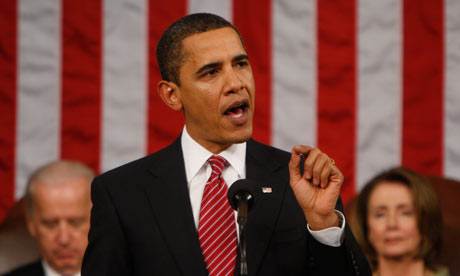 |
| Morgan Spurlock pitching The Greatest Movie Ever Sold |
For what Spurlock says matters less than the way he says it. Cocky with an undertone of ironic self-deprecation that forestalls accusations of insincerity, he is a superb promoter of himself as a brand. In The Greatest Movie Ever Sold he may look ridiculous wearing clothes plastered with corporate logos, but he lets us in on the joke.
Pom Wonderful Presents: The Greatest Movie Ever Sold is even more amusing than Super Size Me, the documentary that put Spurlock on the moviemaking map in 2004. In that film he jeopardized his own health by restricting himself for a month to an all-McDonald’s diet. By the end of his experiment his numbers (weight, cholesterol and blood pressure) had shot up to potentially dangerous levels.
Like Super Size Me his new film is a documentary comedy in the Michael Moore mode but without a political or moral agenda. Spurlock has Moore’s prankster’s instincts, though not his sense of outrage. Exploring product placement in movies and on television, the documentary is as much celebration as it is a critique of what is called co-promotion, in which movies like Spider-Man 2 are infiltrated with images of brand-name products that pay for the exposure. If The Greatest Movie Ever Sold affects the attitude of an exposé, Spurlock is really a gleeful participant in the corruption (if that’s what you want to call it) that his movie purports to criticize.
The conceptual joke is that the entire project was financed by conspicuously placed products in a film that is little more than a string of ads for its sponsors, stitched together with scenes of Spurlock hustling like crazy to line them up. Brief appearances by Noam Chomsky and Ralph Nader lend it a frisson of cultural and intellectual weight.
Spurlock hits the jackpot with Pom Wonderful, the pomegranate juice that markets itself as an antioxidant and that is supposed to have a Viagra effect if you drink enough of it. For $1 million, Pom Wonderful earned the privilege of having its name on the marquee in front of the title of this $1.5 million film.
For Spurlock to get his million his contract with Pom Wonderful stipulated that the movie must gross $10 million at the box office (it didn't, but that's high for a documentary anyway), sell 500,000 DVDs and downloads, and generate 600 million “media impressions.”
Other products prominently featured include Merrell shoes, JetBlue, Hyatt, Sheetz convenience stores, and (mostly bizarrely) Mane ’n Tail, a shampoo marketed to equestrians for use by both humans and horses. Of all the film’s comedic ads the funniest finds Spurlock sharing a bathtub with a tiny pony.
His idea for a “doc-buster” supported by corporate sponsors, he says, was a tough sell. Telephone calls to several hundred companies are met with indifference and sometimes suspicion, which is not surprising because Super Size Me, for all its humor, attacked McDonald’s.
Finally Ban deodorant invites Spurlock to a meeting where he works his fast-talking magic. More than once the movie shows Spurlock, armed with clever storyboards, selling his ideas with an enthusiasm and skill that would put Don Draper of Mad Men to shame.
The actual product placements in which Spurlock is shown plugging the sponsors who eventually sign on to the project are so outrageous that you want to laugh. Here the insidious “hidden persuaders” of Vance Packard’s book on subliminal advertising are gaudily on display.
The movie takes two tangents: one productive, the other mystifying. A visit to São Paulo, Brazil, where outdoor advertising has been banned, is almost shocking for the absence of Times Square-style signs. If the city looks pure without such visual stimulation, it also seems naked and poor.
The movie, which keeps a sprinting momentum, suddenly reaches a dead halt in a section that debates putting advertising in budget-strapped Florida public schools and on school buses to raise money. If the sequence belongs anywhere, it would be in a movie about paying for public education, not advertising.
What would The Greatest Movie Ever Sold be with a different narrator-guide?
It is hard to imagine. Spurlock has the gift of gab along with an undeniable star quality. In fact I’ve already ordered the ab toner and am saving up for a down payment on the Brooklyn Bridge should he offer it up for sale.





























